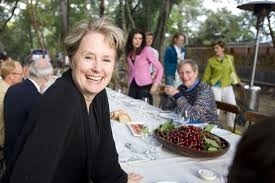The best-tasting food is grown in harmony with nature, by people who respect the land.
Famous for founding the iconic restaurant Chez Panisse in Berkeley, California, Alice Waters has dedicated her life to promoting local, sustainable agriculture and transforming the way we think about food. Now, as she turns her focus to Santa Barbara, she is spearheading a new wave of the Farm-to-Table movement in this coastal community, bringing her passion for fresh, local, and organic food to the forefront.
Background
Waters was born on April 28, 1944, in Chatham Borough, New Jersey. Her father, Charles Allen Waters, was a Rutgers University graduate and worked as a management consultant, while her mother, Margaret Waters, was a homemaker. Alice later attended the University of California, Berkeley, where she earned a degree in French cultural studies in 1967. During her time at Berkeley, she studied abroad in France, immersing herself in the local culture and absorbing the culinary traditions around her.
Inspired by her experiences in France, Waters returned to Berkeley and opened her first restaurant, which embraced the Provence style of cooking. While at Berkeley, Waters also became involved in the Free Speech Movement, which was gaining momentum on campus. She supported the anti-Vietnam War politician Robert Scheer by working on his congressional campaign, where she often cooked and entertained her fellow activists.
 Alice WatersWikiA Lifelong Commitment to Sustainable Food
Alice WatersWikiA Lifelong Commitment to Sustainable Food
Waters has always believed that food should be more than just a source of sustenance and that it should be a source of joy, connection, and health. Farm to Table is a popular concept these days, but mot in 1971! In fact, Chez Panisse was the first Farm to Table restaurant in the USA. And it was Waters pioneering there that revolutionized American cuisine by emphasizing the importance of using fresh, seasonal ingredients sourced from local farmers.
In Santa Barbara, Waters is building on her decades of experience to promote the values that have defined her career. The region, with its rich agricultural heritage and favorable climate, is an ideal setting for her Farm-to-Table advocacy. Waters is working with local farmers, chefs, and community leaders to strengthen the local food system and ensure that everyone in the community has access to high-quality, sustainably produced food.
For Waters, the Farm-to-Table movement is not just about what we eat—it's about how we live. She believes that by fostering a deeper connection to the food we consume, we can cultivate a more thoughtful and responsible society. In Santa Barbara, she is actively involved in initiatives that aim to educate people about the importance of knowing where their food comes from and how it is grown.
Waters is particularly passionate about educating the next generation. Through collaborations with local schools, she is helping to establish garden programs that teach children how to grow and prepare their own food. These programs not only provide students with valuable life skills, but they also instil a sense of responsibility for the environment and an appreciation for the labor that goes into producing food. Waters hopes that by starting young, these students will carry the lessons they learn into adulthood, becoming advocates for sustainable living and mindful eating.
 FlikrAlice WatersThe Chez Panisse Foundation
FlikrAlice WatersThe Chez Panisse Foundation
In addition to managing Chez Panisse, Waters has always seen education as the key to a sustainable future. Over the past several decades, she has worked tirelessly to extend her farm-to-table philosophy beyond the kitchen and into classrooms.
In 1995, to mark the 25th anniversary of Chez Panisse, Waters established the Chez Panisse Foundation. The foundation's mission is to revolutionize public education by using food as a tool to teach, nurture, and empower young people. A key initiative of the foundation has been its collaboration with the Berkeley Unified School District to create a curriculum that integrates food education into the school day, with students involved in growing, cooking, and sharing meals, aiming to foster a more sustainable and humane future.
The Chez Panisse Foundation was instrumental in creating the Edible Schoolyard program at Martin Luther King Jr. Middle School in Berkeley which features a 1-acre organic garden and kitchen classroom where students actively participate in cultivating, harvesting, and preparing food.
Building on the success of the Edible Schoolyard, Waters developed the School Lunch Initiative, which seeks to establish a new relationship between students and food by incorporating healthy, fresh, and sustainable meals into the school day. In 2005, the Chez Panisse Foundation provided funding to hire Ann Cooper as the district’s Nutrition Services Director, leading to the removal of most processed foods and the introduction of organic produce—all while maintaining the district’s budget.
While the Chez Panisse Foundation has focused primarily on Berkeley, Waters has also become a prominent national advocate for school lunch reform. She has urged leaders like President Bill Clinton to plant a White House garden and publicly called for President Obama to establish an organic garden at the White House, which Michelle Obama later did as part of her Let’s Move! campaign against childhood obesity. By 2019, the Edible Schoolyard had a network of more than 5,800 kitchen/garden programs across the country, providing an annual summer academy for food educators and nutrition services personnel. As of May 2023, the network has grown to over 6,200 locations worldwide.
Angela McKee-Brown, the former executive director of the Edible Schoolyard, described Waters as someone ‘deeply committed to education and its transformative power.’ She noted that the project blends food, community, and education into a powerful model of what education can be and what it can mean for children.
One of the hallmarks of Waters' approach to food is her belief in its power to bring people together. In Santa Barbara, she has initiated community events, such as farm-to-table dinners and food festivals, that celebrate local produce and the people who grow it. These gatherings are more than just opportunities to enjoy delicious food—they are a way to strengthen the bonds within the community and create a shared sense of purpose around the importance of sustainable agriculture.
Waters is also a strong advocate for food equity. She is working with local organizations to address food insecurity in Santa Barbara, ensuring that all residents, regardless of income, have access to healthy, fresh food. Her efforts include supporting farmers' markets that accept food assistance programs and promoting community-supported agriculture (CSA) programs that make it easier for people to access local produce.
Waters is taking her Food Climate Hope Campaign to Washington, D.C., prior to Congress taking up the next farm bill. Indeed, on October 19, Waters and University of California President Michael Drake will co-host an event at the Smithsonian in D.C. arguing for the idea of school-supported agriculture as a powerful and universal climate solution.
Waters has written many books, the latest being, ‘We Are What We Eat: A Slow Food Manifesto.’
Page created on 8/30/2024 11:45:09 AM
Last edited 8/30/2024 2:33:55 PM
